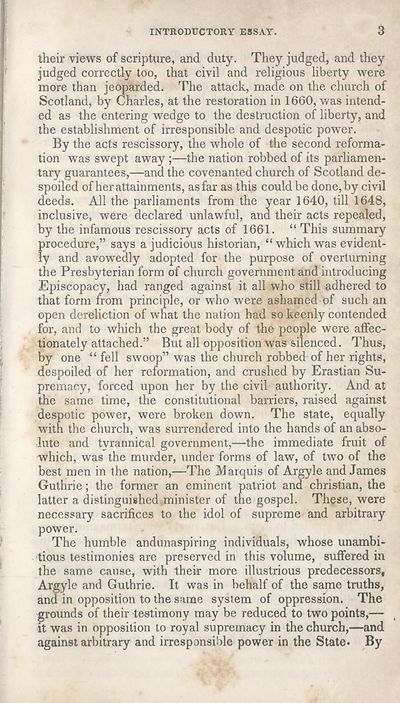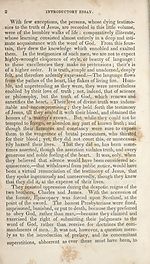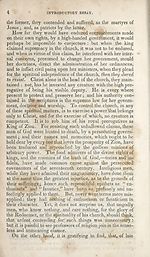Religion & morality > Cloud of witnesses, for the royal prerogatives of Jesus Christ, or, The last speeches and testimonies of those who suffered for the truth in Scotland, in the years 1681-1688, with an appendix, containing the Queensferry paper, Torwood excommunications, &c
(15)
Download files
Complete book:
Individual page:
Thumbnail gallery: Grid view | List view

INTRODUCTORY ESSAY.
3
their views of scripture, and duty. They judged, and they
judged correctly too, that civil and religious liberty were
more than jeoparded. The attack, made on the church of
Scotland, by Charles, at the restoration in 1660, was intend¬
ed as the entering wedge to the destruction of liberty, and
the establishment of irresponsible and despotic power.
By the acts rescissory, the whole of the second reforma¬
tion was swept away ;—the nation robbed of its parliamen¬
tary guarantees,—and the covenanted church of Scotland de¬
spoiled of her attainments, as far as this could be done, by civil
deeds. All the parliaments from the year 1640, till 1648,
inclusive, were declared unlawful, and their acts repealed,
by the infamous rescissory acts of 1661. “ This summary
procedure,” says a judicious historian, “ which was evident¬
ly and avowedly adopted for the purpose of overturning
the Presbyterian form of church government and introducing
Episcopacy, had ranged against it all who still adhered to
that form from principle, or who were ashamed, of such an
open dereliction of what the nation had so keenly contended
for, and to which the great body of the people were affec¬
tionately attached.” But all opposition was silenced. Thus,
by one “ fell swoop” was the church robbed of her rights,
despoiled of her reformation, and crushed by Erastian Su¬
premacy, forced upon her by the civil authority. And at
the same time, the constitutional barriers, raised against
despotic power, were broken down. The state, equally
with the church, was surrendered into the hands of an abso¬
lute and tyrannical government,—the immediate fruit of
which, was the murder, under forms of law, of two of the
best men in the nation,—The Marquis of Argyle and James
Guthrie; the former an eminent patriot and Christian, the
latter a distinguishedjninister of the gospel. These, were
necessary sacrifices to the idol of supreme and arbitrary
power.
The humble andunaspiring individuals, whose unambi¬
tious testimonies are preserved in this volume, suffered in
the same cause, with their more illustrious predecessors,
Argyle and Guthrie. It was in behalf of the same truths,
and in opposition to the same system of oppression. The
grounds of their testimony may be reduced to two points,—
it was in opposition to royal supremacy in the church,—and
against arbitrary and irresponsible power in the State. By
3
their views of scripture, and duty. They judged, and they
judged correctly too, that civil and religious liberty were
more than jeoparded. The attack, made on the church of
Scotland, by Charles, at the restoration in 1660, was intend¬
ed as the entering wedge to the destruction of liberty, and
the establishment of irresponsible and despotic power.
By the acts rescissory, the whole of the second reforma¬
tion was swept away ;—the nation robbed of its parliamen¬
tary guarantees,—and the covenanted church of Scotland de¬
spoiled of her attainments, as far as this could be done, by civil
deeds. All the parliaments from the year 1640, till 1648,
inclusive, were declared unlawful, and their acts repealed,
by the infamous rescissory acts of 1661. “ This summary
procedure,” says a judicious historian, “ which was evident¬
ly and avowedly adopted for the purpose of overturning
the Presbyterian form of church government and introducing
Episcopacy, had ranged against it all who still adhered to
that form from principle, or who were ashamed, of such an
open dereliction of what the nation had so keenly contended
for, and to which the great body of the people were affec¬
tionately attached.” But all opposition was silenced. Thus,
by one “ fell swoop” was the church robbed of her rights,
despoiled of her reformation, and crushed by Erastian Su¬
premacy, forced upon her by the civil authority. And at
the same time, the constitutional barriers, raised against
despotic power, were broken down. The state, equally
with the church, was surrendered into the hands of an abso¬
lute and tyrannical government,—the immediate fruit of
which, was the murder, under forms of law, of two of the
best men in the nation,—The Marquis of Argyle and James
Guthrie; the former an eminent patriot and Christian, the
latter a distinguishedjninister of the gospel. These, were
necessary sacrifices to the idol of supreme and arbitrary
power.
The humble andunaspiring individuals, whose unambi¬
tious testimonies are preserved in this volume, suffered in
the same cause, with their more illustrious predecessors,
Argyle and Guthrie. It was in behalf of the same truths,
and in opposition to the same system of oppression. The
grounds of their testimony may be reduced to two points,—
it was in opposition to royal supremacy in the church,—and
against arbitrary and irresponsible power in the State. By
Set display mode to:
![]() Universal Viewer |
Universal Viewer | ![]() Mirador |
Large image | Transcription
Mirador |
Large image | Transcription
| Permanent URL | https://digital.nls.uk/132215819 |
|---|
| Description | Thousands of printed books from the Antiquarian Books of Scotland collection which dates from 1641 to the 1980s. The collection consists of 14,800 books which were published in Scotland or have a Scottish connection, e.g. through the author, printer or owner. Subjects covered include sport, education, diseases, adventure, occupations, Jacobites, politics and religion. Among the 29 languages represented are English, Gaelic, Italian, French, Russian and Swedish. |
|---|

